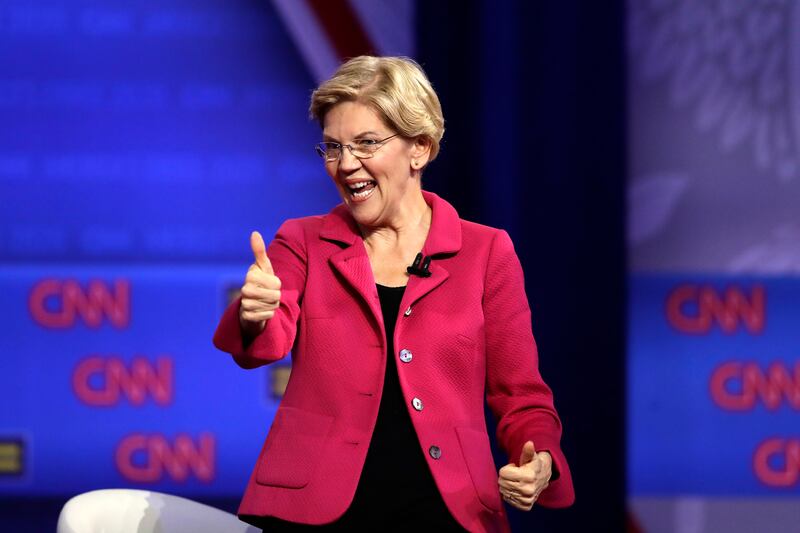Thursday night’s Democratic presidential town hall on LGBTQ rights was a lost opportunity for a true airing of views surrounding the intersection of LGBTQ rights and the rights of religious people to live their faith and beliefs.
Our editorial board has long supported a fairness for all approach that takes the rights of all people into consideration and starts from the very Declaration of Independence upon which this country began: “We hold these Truths to be self-evident, that all Men are created equal, that they are endowed by their Creator with certain unalienable Rights, that among these are Life, Liberty, and the Pursuit of Happiness.
The issue then — and the opportunity lost at the nationally televised CNN and Human Rights Campaign event — was the failure to determine how best for Americans to accomplish this equality. Religious liberty and LGBTQ rights are not mutually exclusive. Voters deserve to hear from candidates in all parties how they believe real-life situations should best be handled.
In other words, the principle is this: All men (and women) are created equal. But what is the application of the principle?
The principle is this: All men (and women) are created equal. But what is the application of the principle?
Sen. Elizabeth Warren was asked what she would say to someone who believes marriage is meant to be between one man and one woman. It’s not a random question. Such men and women abound in America, many of whom believe marriage is sanctioned of God. It’s a sacrament for members of some faiths.
So do they have a right to freely express that opinion? Do they have a right to control marriage, not just in their sanctuaries, but in their other church-owned buildings or homes? Marriage for gay and straight people is the law of the land. We’re interested in hearing the many impacts that is having on all Americans for both good or for ill.
A Gallup poll in 2017 found that three-quarters of Americans identify as Christian, and 37% consider themselves highly religious. Not all these people oppose same-sex marriage, but many do. Rather than engage the question, Warren dismissed it with a joke.
There are so many areas for candidates to explore in this arena: Churches are a place of worship. They are the places people gather to believe in something greater than themselves. Candidates on both sides have said they don’t want to legislate what happens at the pulpit. But it is from that pulpit that humility is born to launch humanitarian works throughout the globe. The world relies on those works.
Should the government partner with a faith-based NGO to build water wells if that faith preaches traditional marriage? If not, who builds the well? That would be an intriguing town hall discussion.
Hundreds of colleges have been built on a foundation of faith, educating generations with a values-rich academic experience. Hospitals have been built on a call to help the least among us. Adoption agencies have been established by faith groups to save children. The courts are weighing many of these issues as it relates to LGBTQ rights and religious liberty. Is it not better to have local, state and federal governing bodies address these issues and respond to their constituencies?
Food pantries and soup kitchens offer help. Sometimes it’s conditioned by hearing a sermon first. Are candidates willing to allow a sermon that preaches a world view they may not believe in in order to help feed the poor? Will they answer that service with a joke, rather than engage the question?
This isn’t a Republican versus Democrat issue. It’s a citizenship issue. How do you bring needed equality to LGBTQ citizens as well as bring faith into the public square, where it is driving so much good work through volunteerism and financial donation to address homelessness, addiction and poverty? Can they not coexist? Even better, can they not complement and work together toward solutions?
What an amazing town hall it would be to have that kind of discussion.
It would be interesting to replace Thursday’s town hall audience with a group of highly religious Americans and ask the same questions. It would be equally interesting, then, to place the 9-year-old transgender student who asked Warren a question in a conservative rally and force Republicans to respond to his query, “What will you do in your first week as president to make sure that kids like me feel safer in schools?” he asked.
It’s an excellent question. And there are dozens and dozens like it that we’d like all candidates to consider.
Elections are becoming contests to see which of the two sides will prevail in order to push, at least temporarily, their own culture war agenda — an agenda that will be largely overturned when the other side one day assumes power.
The nation’s motto is “E pluribus unum,” or “out of many, one.” It is not “out of many, the winner forces its will.” The former requires all sides to come together, respect each other’s concerns and rights, then craft compromises. That’s governing.
The CNN town hall was a single night. There is plenty of time ahead to answer these questions. We hope the candidates do just that.

